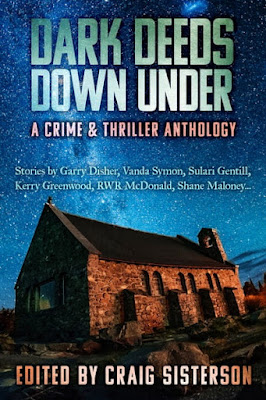Craig every second Tuesday
Kia ora and gidday everyone,
So it's the half-term break here in the UK, and I was meant to be going camping with Miss Seven the past three days - her first 'sleepaway' camp with the local Woodcraft group she's been going to (Woodcraft Folk is a Scouts-like group that I hadn't heard of myself until recently, but has been going for almost 100 years and is pretty big here in the UK - I guess like some of those other outdoorsy groups in the US like Camp Fire etc).
Unfortunately a wee gastro bug on Friday put paid to our plans for the weekend - and my thoughts of writing today about getting out into nature, or revisiting the childhood Scouts/camping/summer camp kinds of thing with my own daughter now rather than being a kid or a leader for others' kids, as I've done in the past. Another time.
But while I was feeling a bit sorry for myself and like the world's worst Dad (I was the one who came down sick just before we were meant to go to camp), something good happened to lift my spirits. Well, Miss Seven was being an absolute trooper and keeping a smile on my face, even though she was pretty disappointed herself - but this was another outside-the-household thing that made me grin when I woke up on Saturday morning: the cover was finalised and the official announcement made about the first anthology I've edited: DARK DEEDS DOWN UNDER.
 |
| DARK DEEDS DOWN UNDER is a first-of-its-kind anthology of Australian & New Zealand crime and thriller short fiction |
So if you'll indulge me, I thought I'd share a bit more about this cool project I've been involved in for the past few months. I'd say 'I'll write about nature next time', but in fact there's a fair bit of nature in this book, threaded through some criminally good stories. After all, the presence and impact of rugged elements (and weather) is one of a few things that can make antipodean crime writing a little distinct and different from its British counterparts.
While you could say that next month's publication of DARK DEEDS DOWN UNDER will be the culmination of a project kickstarted last European summer/autumn, you could also say that the seeds of it all go back far, far further. In a way, it's another culmination of several of the crime writing related things I've been doing the past fourteen years - and that Lindy Cameron, the long-time President of Sisters in Crime Australia as well as the publisher at Clan Destine Press and an acclaimed crime writer in her own right, has been doing for twice as long.
It's been fabulous to collaborate with Lindy and all the authors on DARK DEEDS DOWN UNDER. We have 20 outstanding storytellers in the first volume, a diverse constellation of Aussie & Kiwi storytelling talent. And yes, I said first volume, because due to the enthusiastic response from many, many authors I reached out to as Commissioning Editor we've already decided to make it something of a series. The second volume (many of the stories already gathered for that one) will be out late this year, just before Christmas. And the third, next year.
 |
| The 'Quiet King of Aussie Crime', Garry Disher, is among the authors providing brand-new stories with the series characters for DARK DEEDS DOWN UNDER |
While some things dragged out a little - as many creative projects can do at the best of times, and our pandemic-bruised lives are hardly the best of times - I'm so stoked with how it has all come together. The lineup of 20 authors includes three Ned Kelly Lifetime Achievement Award recipients, multiple Ngaio Marsh Awards, Ned Kelly Awards, and Davitt Awards winners (the three main crime prizes Down Under), and some fresh newer voices too. It's a great mix, with authors ranging from 30s to 90s, across most states and territories, and several writers of colour.
I couldn't be happier with how it has come together, and I'm looking forward to keen crime readers out there getting a chance to try the stories. Several include characters familiar to keen crime readers from books series, eg Constable Paul 'Hirsch' Hirschhausen from Garry Disher's award-winning books, Vanda Symon's Detective Sam Shephard, Sulari Gentill's gentleman sleuth Rowly Sinclair, Kerry Greenwoods baker and amateur sleuth Corinna Chapman, and more. From the raucous antics of the Nancys in small-town Otago to a prequel tale starring Dinuka McKenzie's Kate Miles, to the futuristic noir escapades of Matiu and Penny Yee in a supernatural-tinged Auckland, DARK DEEDS DOWN UNDER has got quite the mix of characters whose adventures you can follow elsewhere too.
It also includes some brilliant standalone crime tales.
And the long-awaited return of Murray Whelan, the political functionary who found himself investigating crimes linked to his job in an outstanding series of novels by Shane Maloney that were first published in Australia and internationally between 1994-2007, and made Maloney Australia's most popular crime writer of the time.
 |
| David Wenham starred as Murray Whelan in a TV adaptation in 2004. Our anthology includes the first new Murray Whelan tale in 15 years |
I feel very honoured and privileged to get to be the Commissioning editor of this book (series) that showcases some of the amazing modern-day crime writers we have in Australia and New Zealand. While I know short stories and anthologies aren't for everyone, I hope the keen crime readers out there will give it a go.
Here's a sneak peek at the line-up in Volume One:
- Alan Carter
- Nikki Crutchley
- Aoife Clifford
- Garry Disher
- Helen Vivienne Fletcher
- Lisa Fuller
- Sulari Gentill
- Kerry Greenwood
- Narelle Harris
- Katherine Kovacic
- Shane Maloney
- RWR McDonald
- Dinuka McKenzie
- Lee Murray & Dan Rabarts
- Renee
- Fiona Sussman
- Stephen Ross
- Vanda Symon
- David Whish-Wilson
 |
| Sulari Gentill, who was born in Sri Lanka and now lives in the Snowy Mountains, offers readers a prequel to her award-winning Rowly Sinclair historical mysteries |
There's lots more I could say about DARK DEEDS DOWN UNDER, but perhaps another time. For now, I'm just swimming in gratitude for the Aussie & Kiwi crime writing community. It's been a pleasure.
Stay safe, and happy reading.
Until next time, ka kita ano.
Whakataukī of the fortnight:
Inspired by Zoe and her 'word of the week', I've been ending my fortnightly posts by sharing a whakataukī (Māori proverb), a pithy and poetic thought to mull on as we go through life. I'd usually never use the same whakatauki in repeated posts, but given this one's celebrating storytelling on s small scale, it seemed particularly apt.
Ahakoa he iti he pounamu
(Although it is small, it is greenstone)
 |
| Pounamu are treasured items carved in a variety of traditional designs. While they are relatively small - often worn as necklaces - they are powerful and full of meaning. |





































